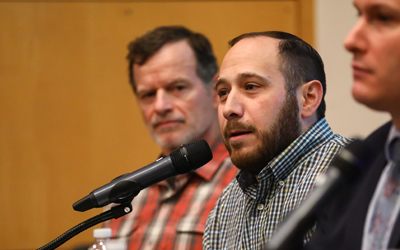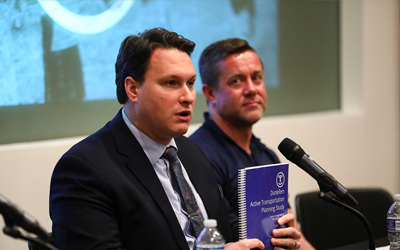“The Street Project” documentary aims to uncover the truth about a troubling trend: more and more people walking and bicycling are being seriously injured or killed on American roads. The filmmakers engaged experts including street historian Peter Norton, city planner Jeff Speck, and urban design expert Mikael Colville-Andersen, and interviews with the stories of local champions working to make their communities safer. It is an inspiring story about a movement to make our largest public spaces–our streets–safer.
On February 6, 2024, the Bloustein School and American Planning Association – New Jersey Chapter (APA-NJ) with support from the New Jersey Department of Transportation (NJDOT) through the New Jersey Bicycle and Pedestrian Resource Center at the Alan M. Voorhees Transportation Center, hosted a film screening of the documentary followed by a panel discussion.

Michael Manzella, director of transportation planning for the City of Jersey City, NJ
Michael Manzella, director of transportation planning for Jersey City, NJ, emphasized the implementation of safer cycling infrastructure such as protected bike lanes and physical barriers. He believes there are opportunities to create more pedestrian-focused spaces around train stations and in business districts through temporary demonstration projects.
“I think temporary demonstration projects are an excellent way to engage the community and lead to permanent changes,” he said. “Temporary demonstration projects in Jersey City – and we’ve done a lot of them — help us respond quickly to the demands of city residents looking for change and looking to make the streets safer.” At the same time, he noted, these types of projects acknowledge the challenges of limited timeframes for implementing improvements through federal funding.
Paul Mickiewicz is the program manager for the New Jersey Bike Walk Coalition and president of Bike and Walk Montclair. He highlighted the importance of having policies and advisory committees in place at the local level to improve the chances of getting funding and implementing projects.
Temporary demonstration projects, education, and initiatives such as the Bike Bus, he said, as well as addressing issues like parking can help overcome obstacles to bike infrastructure projects over time through incremental changes and gaining community support.
Bloustein School Assistant Professor Michael Smart underscored the importance of acknowledging and addressing systemic issues in street design to prioritize safety for vulnerable groups, particularly children. Dr. Smart also discussed the economic justice perspective of delivery workers on electric bikes who are under immense time pressure due to their jobs in the gig economy.
emphasized that changes to transportation infrastructure and safety need to be implemented incrementally over time to bring the community along.

Jason Cilento, Mayor of Dunellen, NJ displays a copy of the Dunellen Active Transportation Planning Study.
Mayor Jason Cilento of Dunellen, NJ said, “It comes back to education and engaging the community. In Dunellen, we created the Mayor’s Traffic and Pedestrian Safety Task Force, which uses stakeholders in the community to work on education campaigns across the entire borough, but also through our school systems because we’re such a small town.”
Adopting a complete streets policy has been possible for Dunellen, he explained, as they incorporated safety goals into the borough’s 10-year capital improvement plan through partnerships with other jurisdictions, including technical assistance and grant funding.
The post-documentary panel underscored the importance of transportation safety and community engagement. Panelists agreed on the need to further protect pedestrians and cyclists in New Jersey’s municipalities through education, infrastructure improvements, and bringing stakeholders together to address challenges collaboratively. Temporary demonstration projects, complete street policies, and incremental changes over time will help implement safety measures while gaining community engagement and support.
